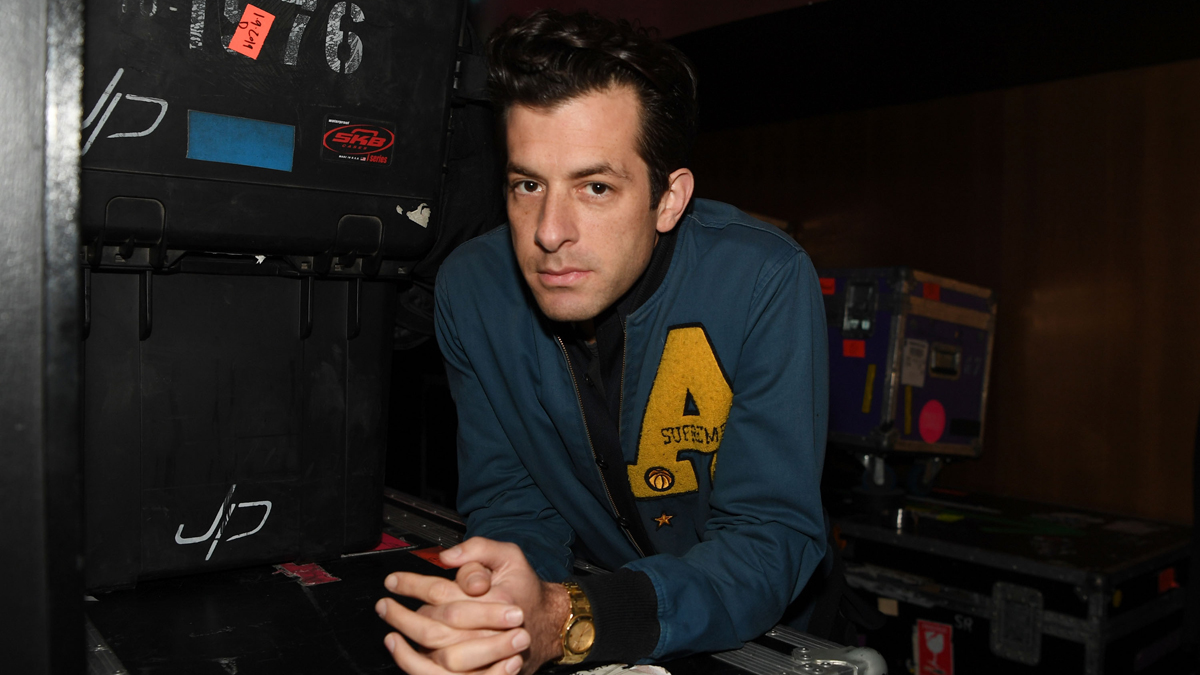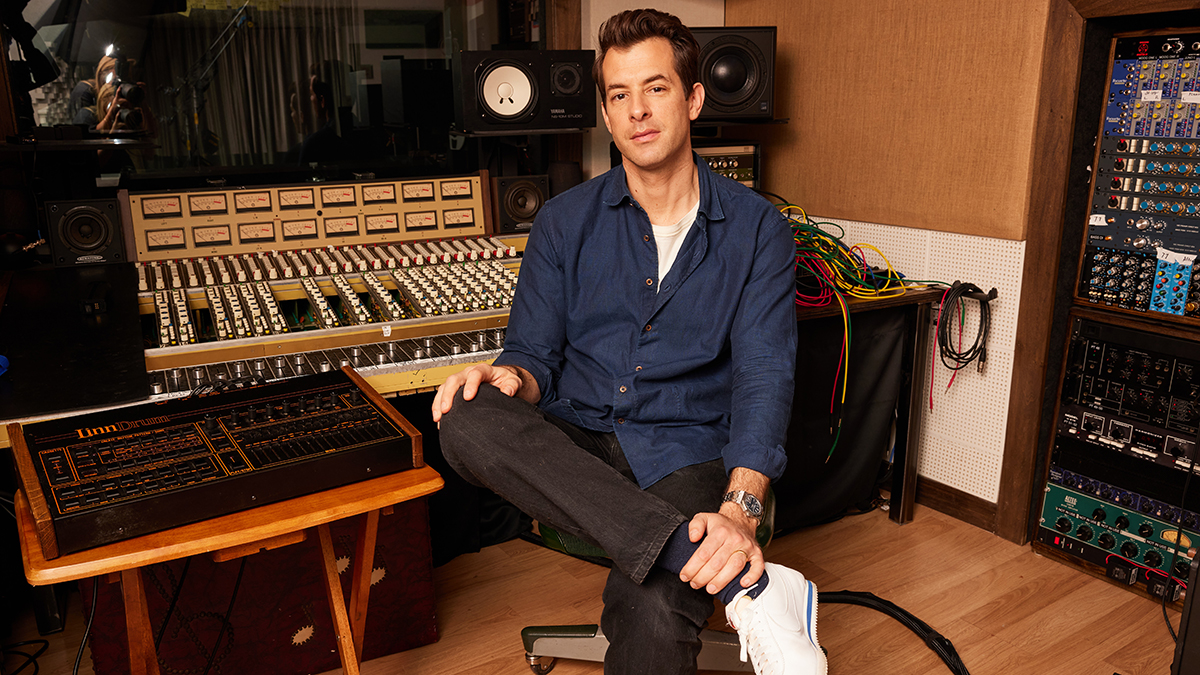5 Mark Ronson tracks producers need to hear
We take a time-travelling trip through the mind and music of the uptown funker

Want all the hottest music and gear news, reviews, deals, features and more, direct to your inbox? Sign up here.
You are now subscribed
Your newsletter sign-up was successful
Born today, 4 September 1975, Mark Ronson has a head in the past and one foot in the future, ably straddling the worlds of soul, funk, rock, hip-hop and pop like a sulky, mop-topped leviathan. At one turn shameless copyist, at another one of the world’s most clued-up innovators.
Join us for our top five pick of Ronson's solo artist tracks and stellar superstar production work as we take stock of the master of the sad banger. Then stick around for our extended play of further listening surprises…
1. Ooh Wee - Mark Ronson, Mos Def and M.O.P
Part Wu Tang, part N.E.R.D, all Ronson. The haters never got past the fact that Ronson came from privileged musical stock and - therefore - had no business crossing the tracks. But we like to think that, when the obstacles come down and the possibilities open up, ultimately, it’s talent that pays the bills. And that works both ways, including the stepson of (I Wanna Know What Love Is) Foreigner’s Mick Jones making an album with Ghostface Killah, M.O.P, Sean Paul and Nate Dogg.
Yes, Ronson’s debut album Here Comes The Fuzz is surprisingly, authentically dope, and despite that UK-centric title, the US rap fraternity on board give it yards of genuine flava. This funky-ass white-boy-on-gap-year done good.

Mark Ronson breaks down Amy Winehouse’s Black to Black demo in Pro Tools: “I just had basic plugins”
Full marks to the album’s excellent Lenny Kravitz-sampling On The Run (with Guns N Roses’ Slash on guitar) and the Q-Tip toting Tomorrow, but it has to be the excitement glitter bomb Ooh Wee that’s ultimately our pick of the bunch.
Ooh Wee is a joyous combo of dreamy drenched disco strings from Boney M’s Sunny and the insane bongo beat of Dennis Coffey’s Scorpio, which merge under Mardi Gras-style clattering agogo bells and some 100% on point raps.
As lead single from his debut album, the track earned Ronson his right to party, though the rest of the raps take a turn for the tough, as if to prove a point that he really can cut it rather than plunder with pure pop. The result is that, while the single earned a respectable number 15 chart placing in the UK (but didn’t break the Billboard hot 100 in the States), the album fared rather less well, reaching 70 UK and 84 US.
Want all the hottest music and gear news, reviews, deals, features and more, direct to your inbox? Sign up here.
At the end of the day Fuzz was a case of a little too much, too young, as Elektra, sensing the imminent downturn in interest and lack of more palatable singles to come, dropped Ronson just two weeks after the album’s release. But before we brush the Fuzz away, do listen out for album closer Rashi, which sets the scene perfectly, segueing Ronson’s style into his next (smash hit) album Version…
2. Stop Me - Mark Ronson featuring Daniel Merriweather
Skipping to the chase, Version sealed the deal for Ronson. To decry it as ‘an album of covers’ is to do it a massive disservice. Instead, it’s a chunky, cohesive bundle of radical reworkings that all share the same funky, retro-fuelled DNA. It’s a sterling piece of work made all the more remarkable when you consider the mis-fired posh-boy brat-rap album that preceded it.
Leaning heavily on Ronson’s multi-instrumental skills, an accelerating maturity and a willingness to explore in the studio, Version was a critical and chart hit, reaching number 2 in the UK. However, perhaps because the songs on board are British, off-centre ‘smart’ hits, the selection seems not to have resonated with a US audience, with the album merely reaching number 129 stateside.
The triple threat of openers God Put a Smile on Your Face (with the Daptone Horns), Oh My God (with Lily Allen) and Stop Me (with Daniel Merriweather) flawlessly deliver Version’s message and make you want to stick around. Pretty soon you’re forgetting original artists, no longer gasping at the audacity of the rewrites and merrily going with Ronson’s flow.
Our pick of the bunch is the excellent Stop Me, in which Merriweather calmly erases any memory of Morrissey’s thin whinge and Ronson sweeps away The Smiths’ jangling strum-along beat combo stylings. And when that beat drops at 0:50…
This track did, of course, attract the most ire at the time (‘You can’t ‘do’ The Smiths!’) but, alongside Amy Winehouse’s take on The Zutons’ Valerie, it’s one of two tracks from Version that, for us, are genuinely better than the originals.
The only stumble is Ronson and Ol’ Dirty Bastard’s take on Britney Spears' Toxic, which comes across as an attempt to shoe-horn a song into a style rather than the other way round.
3. Locked Out of Heaven - Bruno Mars
So, when was it exactly that earnest diminutive crooner Bruno Mars reinvented himself as strutting larger than life pimp playa? It’s around about here, with Mars’ second, funkier Unorthodox Jukebox album from 2012, and its biggest hit, Locked Out of Heaven - co-produced by Mark Ronson.
We weren’t sure about putting this one on the list, but it’s too damn good, being a certified global smash that got to number 2 in the UK and all the way to the top in the States.
Powered by sharp, stabbing new wave guitar and choppy, live drumming, it’s bright, upfront and packed with irresistible energy. And that whooping looping siren in the chorus gets us every time. However, it’s the track’s shameless Police parody that is most memorable for musicologists.
It’s hard to put your finger on quite why so many people hate The Police… but it’s Sting, isn’t it? Do the Russians love their children? If you love somebody should you actually set them free? Just what is it crawling to the surface of that dark Scottish loch?… So many questions…
But imagine, for a moment, that the excellent Locked Out of Heaven was actually a storming Sting comeback single. Close your eyes. Listen. Imagine it. It’s booming out of the radio and… damn… it’s good! I hate to say it, but he’s still got it. I take everything back. This is genius! So fresh. So original. So unmistakably 100% Sting!… Only it’s Bruno Mars, co-produced by Mark Ronson. Damn. And you didn’t dream it. This actually happened.
4. Don’t Leave Me Lonely - Mark Ronson featuring YEBBA
Anyone who dismisses Ronson as pure retro - a monger of better times gone by, of (re)pedalling ‘proper music’ instead of making ‘real music’ - should take a listen to his fifth artist album Late Night Feelings and have their ears opened. Ronson himself has described the album as “definitely the best thing” that he has made, and we agree.
Late Night Feelings gets the balance just right. There’s Ronson’s familiar class and soul but the exercise is no retro re-tread. The desire to prove his worth through pastiche or sound-alike (founded in Version and all over Uptown Special) is finally forgotten in favour of putting all he’s learnt into something actually new.
Our pick of the bunch is Don’t Leave Me Lonely, with a familiar powerful, soulful lead vocal by YEBBA, couched in a silky string arrangement that’s pure Ronson. However, it’s the shuffling one/two beat that’s the real revelation, powering up this dark smoky track into state-of-the art pop ‘hit’.
We say ‘hit’ because that’s exactly what it wasn’t, not charting in the States and only reaching number 58 in the UK. It’s therefore one that may well have passed you by. Until now.
Maximum chapeau respect for the inclusion of Yamaha’s triple-decked legend ‘Dream Machine’ GX-1 in the video and likewise to the excellent Nothing Breaks Like A Heart (also on board Late Night Feelings) for not only saving Miley Cyrus’s career, but her sanity, too.
5. Rehab - Amy Winehouse
Finally. We had to go there. Is there a more tragic, more poignant and prophetic song than Amy Winehouse’s Rehab? It’s as if Elvis had released Overeating (Trust Me, I’ll Be Fine) or Mark Bolan had recorded Driving Too Fast (What Could Possibly Go Wrong?).
The track’s origin story sees Ronson and Winehouse in New York, taking a break from recording, walking to a store to buy a present for her boyfriend and talking about recent events. Winehouse was in peak trouble at this point, and her management team had tried and failed to intervene in her predicament.
In an attempt to step up the recovery process she had been visited in New York by her father but the meeting didn’t go well. “He tried to make me go to rehab, and I was like, pfft, no no no,” she told Ronson…
Part Etta James, part Ella Fitzgerald in delivery, it’s actually girl group The Ronettes that played the biggest influence on Winehouse’s stylings. She borrowed both their vocal style and distinctive ‘60s outsize hair-dos, a necessity of the teenage trio’s attempts to look older in order to gain access to nightclubs.
Rehab and the Back to Black album that bears it sound so much a part of the musical landscape in 2021, but back on release in 2006, before Ronson’s cap-doffing Version, this fusing of old and new was fresh out of the box. Tracks such as Tears Dry On Their Own (produced by Salaam Remi and alongside Rehab on Winehouse’s Back to Black album) plunder the past with such care and deference that it’s impossible to wag a finger and cry plagiarism. This music sounds great. Just leave it.
But perhaps Winehouse’s greatest legacy won’t actually be her songs but her discovery of an audience for female artists that put talent above all other superficial considerations. Eager to ape Island’s success with Winehouse, she kick-started a soulful, retro and respectful trend for female singers with the likes of A&M’s Duffy, Atlantic’s Estelle, and - to the most devastating effect - XL’s Adele, all subsequently signed and styled to serve Amy’s audience.
Further listening
Stop if you think that you’ve heard these ones before… We couldn’t quit without serving up six more essential Ronson burners…
But first…
Mortdecai – Original Motion Picture Soundtrack
Hey! Who doesn’t love Mortdecai? You know. Mortdecai! The 2015 movie/stink-bomb that bagged both Johnny Depp and Gwyneth Paltrow at the peak of their ‘wtf is wrong with these people?’ public perception before sealing them inside a block of career carbonite? Yeah, that one! You mean you haven’t read Kyril Bonfiglioli’s needless Wodehouse-rewiring ‘cheeky art thief’ novels? Yeah, us neither!
Good job that they snared Mark Ronson to deliver the soundtrack, then, who effortlessly (to the point of practically semaphoring it in) parps out a conspicuous, self-conscious, honking pastiche that fits the movie perfectly. In other words, it’s shit.
Amazingly, the album doesn’t feature tracks named ‘Will This Do?’ or ‘Cheque Please’, instead drunkenly slurring from music best described as ‘Pissed Panther’ to the kind of ‘faux-funk’ last heard announcing the arrival of Bodie and Doyle’s knees to your bollocks.
Avoid entirely and treat yourself to a swig of the real stuff here. Or - if you must - suffer Mortdecai’s oh-so authentically out of tune Heart’s A Liar here.
We’ve never been fans of Allen’s breakout Alright, Still smash (it’s the whole Tesco/alfresco thing) but we’ve always had time for its wonky, plaintive piano ditty Littlest Things, produced and co-written by Ronson.
Sounds familiar, right? Let us help you out. It’s half Cat Stevens Wild World (and by association, therefore, half Pet Shop Boys It’s A Sin) and half Barry Manilow Could It Be Magic.
OK. A cheeky one. While Williams’ own version, the second single from the suicidally patchy, hanging-by-a-thread Rudebox, IS produced by Ronson (and a shining gem amongst the grasping-at-straws studio debris surrounding it) it’s actually a cover version. So, by all means enjoy Williams and Ronson’s remake here, but be sure to check out the criminally overlooked Stoned, Pt.1 album by multi-instrumentalist Lewis Taylor that bears the less slick, but better original.
Never Miss A Beat - Kaiser Chiefs
Raucous brickie-glam rock from the production pen of Mark Ronson, aping the lumpen likes of Mott The Hoople, etc. Marvel at the barmy extra ‘take a look...’ leading into the chorus and listen very closely for Lily Allen on backing vocals.
If you like your Ronson productions steeped in the past you can’t get Dusty-ier than Release Me by The Like. Still with his head in the past post Vertigo, Ronson went all out ‘60s for his 2010 production work across the second album by the Californian, all-girl hipsters. This is what happens when you shove ‘60s US girl group and spikey UK Troggs backing into the Magimix. Like a hairy humbug, it’s an entirely retro confection and a production fun house of handclaps-meets-Vox Continental organ. Groovy.
How sampling transformed music - Mark Ronson’s TED talk
OK. Not a track at all but Ronson’s 2014 talk for TED - quite probably the most interesting TED talk you’ll ever make it to the end of.
Rather than predictably ‘turning things on their head’, jamming jargon into common sense, or creating a machine for blowing smoke up their own ass, this speaker spits gold, serving up a potted history of sampling with a clear beginning, middle and end.
Perhaps the TED team had Ronson on board for mere novelty (‘Ho ho - look at the funny DJ doing a lecture!’) but he eloquently plays (and beats) the nerds at their own game.


Daniel Griffiths is a veteran journalist who has worked on some of the biggest entertainment, tech and home brands in the world. He's interviewed countless big names, and covered countless new releases in the fields of music, videogames, movies, tech, gadgets, home improvement, self build, interiors and garden design. He’s the ex-Editor of Future Music and ex-Group Editor-in-Chief of Electronic Musician, Guitarist, Guitar World, Computer Music and more. He renovates property and writes for MusicRadar.com.
